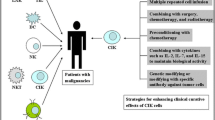Abstract
Objective
This article is to verify feasibility and validity of autologous cytokine-induced killer cell (Auto -CIK) treatment in solid malignancy patients.
Methods
Amplification, phenotypic characteristics, cytokine secretion, antitumor cytotoxicity and clinical response to Auto-CIK derived from 65 cases of solid tumor patients with different pathological types and clinical stages were compared with LAKs in a large-scale clinical trial.
Results
We found that seriousness of disease and metastatic status had no influence on effective components and antitumor immunological activity of Auto-CIK. Comparing cytotoxicity against various tumor cells with LAKs at various effector to target ratios, CIKs showed more effective cytotoxicity against NK sensitive or non-sensitive solid tumor cell lines at a low E/T ratio (6:1) which suggests indirectly that Auto-CIK had a longer effective time in vivo than LAKs. These results suggest that CIKs are more suitable for immunotherapy for those solid malignancy patients at high risk of relapse or recurrence.
Conclusions
Our experimental data were consistent with the reported conclusion that the potent antitumor activity of Auto-CIK mainly rooted in the CD4- part of CIKs, including CD3+CD56+ cells and CD8+ CTLs. The CD4+ part of CIKs seemed to have no direct tumor lytic activity. The results indicate that the special “Th1 bias” and enhanced cytotoxicity against K562 cells occurred in PBMCs after multicycles of Auto-CIK infusions suggesting the induction of a “Th1 shift” and rectification of “Th2 dominance” in PBMC after Auto-C IK treatments.
Similar content being viewed by others
References
Schmidt-Wolf GD, Negrin RS, Schmidt-Wolf IG. Activated T cells and cytokine-induced CD3+CD56+ killer cells. Ann Hematol. 1997; 74:51–56.
Margolin KA, Negrin RS, Wong KK, et al. Cellular immunotherapy and autologous transplantation for hematologic malignancy. Immunol Rev. 1997; 157:231–240.
Lu PH, Negrin RS. A novel population of expanded human CD3+CD56+ cells derived from T cells with potent in vivo antitumor activity in mice with severe combined immunodeficiency. J Immunol. 1994; 153:1687–1696.
Schmidt-Wolf IG, Lefterova P, Johnston V, et al. Sensitivity of multidrug-resistant tumor cell lines to immunologic effector cells. Cell Immunol. 1996; 169:85–90.
Hoyle C, Bangs CD, Chang P, et al. Expansion of Philadelphia chromosome-negative CD3(+)CD56(+) cytotoxic cells from chronic myeloid leukemia patients: in vitro and in vivo efficacy in severe combined immunodeficiency disease mice. Blood. 1998; 92:3318–3327.
Verneris MR, Kornacker M, Mailander V, et al. Resistance of ex vivo expanded CD3+CD56+ T cells to Fas-mediated apoptosis. Cancer Immunol Immunother. 2000; 49:335–345.
Scheffold C, Brandt K, Johnston V, et al. Potential of autologous immunologie effector cells for bone marrow purging in patients with chronic myeloid leukemia. Bone Marrow Transplant. 1995; 15:33–39.
Muller M, Scheffold C, Lefterova P, et al. Potential of autologous immunologie effector cells for prediction of progression of disease in patients with chronic myelogenous leukemia. Leuk Lymphoma. 1998; 31:335–341.
Linn YC, Lau LC, Hui KM. Generation of cytokine-induced killer cells from leukaemic samples with in vitro cytotoxicity against autologous and allogeneic leukaemic blasts. Br J Haematol. 2002; 116:78–86.
Grimm EA, Mazumder A, Zhang HZ, et al. Lymphokine activated killer cell phenomenon: lysis of natural killer resistant fresh solid lymphocytes. J Exp Med. 1982; 155: 1823–1841.
Rosenberg SA, Spiess P, Lafreniere R. A new approach to the adoptive immunotherapy of cancer with tumor infiltrating lymphocytes. Science. 1986; 233:1318–1321.
Mehta BA, Schmidt-Wolf IG, Weissman IL, et al. Two pathways of exocytosis of cytoplasmic granule contents and target cell killing by cytokine-induced CD3+ CD56+ killer cells. Blood. 1995; 86:3493–3499.
Schmidt-Wolf IG, Finke S, Trojaneck B, et al. Phase I clinical study applying autologous immunological effector cells transfected with the interleukin-2 gene in patients with metastatic renal cancer, colorectal cancer and lymphoma. Br J Cancer. 1999; 81:1009–1116.
Mori T, Takada R, Watanabe R, et al. T-helper(Th)l/Th2 imbalance in patients with previously untreated B-cell diffuse large cell lymphoma. Cancer Immunol Immunother. 2001; 50:566–568.
Sato M, Goto S, Kaneko R, et al. Impaired production of Thl cytokines and increased frequency of Th2 subsets in PBMC from advanced cancer patients. Anticancer Res. 1998; 18:3951–3955.
Author information
Authors and Affiliations
Corresponding author
Additional information
This work was supported by grants from Tianjin Nature Science Fundation (No. 023611011).
About this article
Cite this article
Ren, X., Yu, J., Liu, H. et al. Thl Bias in PBAAC induced by large scale auto - CIK infusion in malignant solid tumor patients in China. Chin. J. Clin. Oncol. 1, 284–294 (2004). https://doi.org/10.1007/BF02739815
Received:
Accepted:
Issue Date:
DOI: https://doi.org/10.1007/BF02739815




